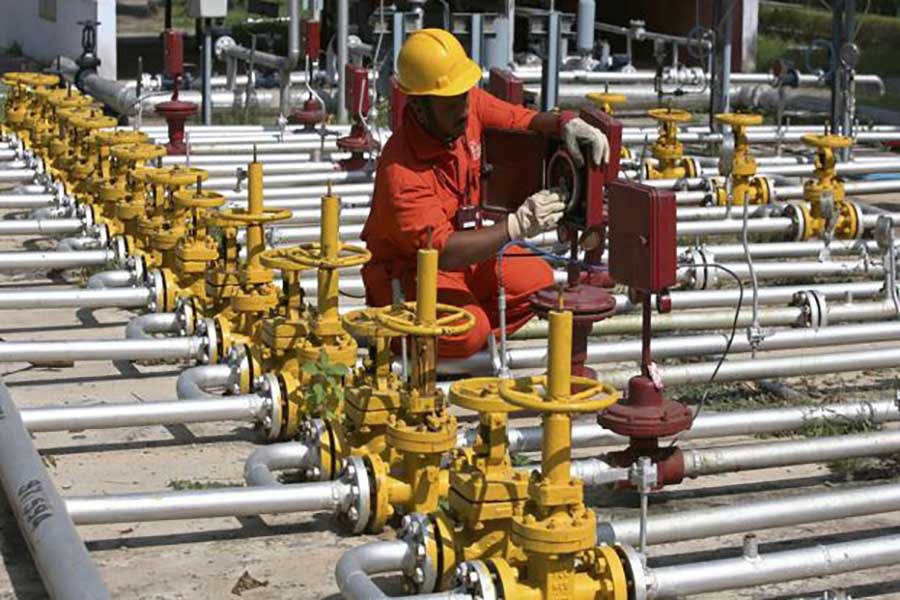Factories in the country's Tongi-Gazipur industrial belt have been facing acute gas crisis over the past few months following diversion of gas to 'upstream' power plants.
The crisis has deteriorated further this week albeit some improvements for a few days last week, said local industrialists and businessmen.
According to them, if the ongoing gas crisis persists they may be forced to shut down their factories. Officials of the Titas Gas Transmission and Distribution Company Limited (TGTDCL), however, blamed the Petrobangla for the gas crunch.
Sources concerned say the industrial belt of Tongi-Gazipur is suffering badly for about four to five months from low pressure of gas coupled with poor electricity voltage -- often resulting in huge volume of industrial wastages and reduction of production efficiency.
According to the industry insiders, a factory in the industrial belt requires 04 PSI (production per square inch) as optimum gas pressure but the pressure, at times, comes down to as low as 0.1 PSI these days -- especially during the daytime.
"Gas pressure in the area becomes normal around 10pm/11pm and stays for not more than 08 hours until 6am/7am," an entrepreneur of the industrial belt informed.
Asked, an official of Titas said they are at present getting nearly 250 million cubic meters (MCM) less in recent weeks against their current demand of 1,800 MCM gas in Titas franchise.
The downstream Titas franchise area covers greater Dhaka region, which includes Gazipur alongside some other adjoining districts, and greater Mymensingh, he said.
A Petrobangla source, however, cited gas supply on priority basis to a number of upstream projects including power plants as reason behind supply shortage.
When asked, Managing Director of Akij Group Sk. Bashir Uddin termed the situation 'really worrisome.'
According to him, two of Akij Group companies situated in the area -- Akij Printing & Packages Limited and Dhaka Tobacco Industries -- jointly contributed nearly Tk 35 billion (3,500 crore) to the national exchequer in the 2016-17 fiscal year.
"But we're very much worried about our industrial output this year as production disruption following the twin crises involving gas supply and power supply. Both will eventually disrupt our retail business in every phase," he quipped.
This often results in a high rate of industrial wastage and reduction of production efficiency, he added.
Bangladesh Auto Re-rolling Steel Mills & Association Chairman Manwar Hossain, who is also Anwar Group Managing Director, echoed the same concern.
"Factories in the industrial belt are now operating at one-third of their capacity, which may lead to labour unrest and default of huge sum of bank loans," he said.
Such disruption of production, he cautions, may even cause sudden shutdown of factories.
According to him, none of the victims in that case will be the wilful defaulters -- they will be the victims of circumstances.
The businessman, who has a steel factory called Anwar Ispat Limited in the industrial belt, called for immediate introduction of ECM (electronically controlled meters) to check unabated gas engineering in the area, which he deems to be yet another reason for gas supply crunch.
Titas officials, according to him, are encouraging co-generation scheme to help address the severe gas crisis. But he said co-generation will require stable and smooth gas supply.
Government should ensure at least 10-15 years of smooth gas supply to encourage co-generation as, what he said, any industrial investment requires 20 years of payback period.
TGTDCL Deputy Managing Director Engineer Abdul Wahab Talukdar, who is also the Project Director of Sripur-Joydevpur Transmission Pipeline Project, said, "We cannot do anything to address the crisis if there is a lack of adequate gas supply."
Mentioning that 'all factories in the industrial belt are like my babies', he unequivocally said, "Titas is not at fault."
He also admitted that priority-based power plants' gas supply being the reason behind the current spell of gas crunch.
"We have already started introducing electronic volumetric corrector (EVC) to stop illegal gas use in the area," he said.
Factories, he added, should go for co-generation scheme for protecting their own interest.
Co-generation means utilising and absorbing heat generated from gas generators, which Mr Wahab said, will save energy.
A section of the businessmen, however, called for stopping fertiliser production and distributing the same among people at a subsidised price after importing it to facilitate smooth supply of gas to other industries.
"Even if the government stops fertiliser production and opts for importing it for distribution at a subsidised rate, there will only be an insignificant loss compared to the overall losses now being incurred," said an industrialist who has more than one factory in the industrial belt.
Local sources said illegal and unapproved gas connections in various industries in and around the zone are also affecting gas supply badly, among other reasons.


